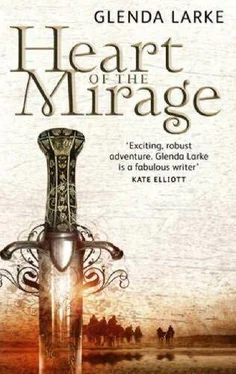Glenda Larke - The Heart of the mirage
Здесь есть возможность читать онлайн «Glenda Larke - The Heart of the mirage» весь текст электронной книги совершенно бесплатно (целиком полную версию без сокращений). В некоторых случаях можно слушать аудио, скачать через торрент в формате fb2 и присутствует краткое содержание. Жанр: Триллер, на английском языке. Описание произведения, (предисловие) а так же отзывы посетителей доступны на портале библиотеки ЛибКат.
- Название:The Heart of the mirage
- Автор:
- Жанр:
- Год:неизвестен
- ISBN:нет данных
- Рейтинг книги:4 / 5. Голосов: 1
-
Избранное:Добавить в избранное
- Отзывы:
-
Ваша оценка:
- 80
- 1
- 2
- 3
- 4
- 5
The Heart of the mirage: краткое содержание, описание и аннотация
Предлагаем к чтению аннотацию, описание, краткое содержание или предисловие (зависит от того, что написал сам автор книги «The Heart of the mirage»). Если вы не нашли необходимую информацию о книге — напишите в комментариях, мы постараемся отыскать её.
The Heart of the mirage — читать онлайн бесплатно полную книгу (весь текст) целиком
Ниже представлен текст книги, разбитый по страницам. Система сохранения места последней прочитанной страницы, позволяет с удобством читать онлайн бесплатно книгу «The Heart of the mirage», без необходимости каждый раз заново искать на чём Вы остановились. Поставьте закладку, и сможете в любой момент перейти на страницу, на которой закончили чтение.
Интервал:
Закладка:
And then, just when it seemed Kardiastan was a dead world, we would come upon a wide, gentle-sided valley where it was hard to believe it never rained. In these lush vales, the soil was rich, the vegetation prolific and flocks of waterbirds skimmed azure pools and lakes. I liked the contrast, the abrupt change from the hot reds and oranges and browns of the desert sands and stones to the cool greens and blues of the low-lying areas between.
'But where does all the water come from?' Brand asked in wonderment. Aemid's explanation, begrudgingly given, was that in such low-lying areas water seeped up from under the ground to create havens for life; it was only the higher areas between that were dry.
Most of the valleys were settled by Kardis. Domestic animals grazed under the watchful eye of Kardi herders. Wild coppices separated fields planted with grain and other crops; fruit trees lined the meadows. Every so often, windmills with hide sails pumped water to irrigation systems. Villages and towns were never built in the centres of these dales as might have been expected, but on the edges where the soil was too dry and stony to be tilled. The houses were of adobe and blended unobtrusively into the desert landscape beyond them.
Curious to see the interiors, several times I stopped and asked an owner's permission to enter. The request was never refused, but we were never offered the hospitality of a seat or a drink, either.
Cool and dim inside, the rooms had stone-tiled floors and simple wicker furniture. I thought them spartan and was inclined to be disparaging – until I saw what Tyrans had wrought.
Where the Tyranian civil or military administration wanted wayhouses, they had erected vast stone and marble buildings, usually on a lakeside, marking the landscape – as Brand asserted – like gorclak turds in a flowerbed. For the first time I found my admiration for Tyranian progress was tinged with embarrassment. I had once regarded such monuments as magnificent, symbolic of the might and grandeur of Tyrans; now I looked and saw an oppressive lack of imagination, a desire to dominate rather than to belong. What was Tyranian suddenly seemed to lack grace and subtlety.
The Tyranian architecture out of a Tyranian context might have irked me, but my reaction to it appalled me. I couldn't understand how I, who had always loved all that was Tyranian, could feel that way. This strange land with its mystic beauty was shredding the solidness of the foundations on which I had built my life, and I didn't want to look inside myself to find out why.
Still, ugly buildings or not, I was glad enough to accept the comforts of a wayhouse after a day in the saddle. To sink into a perfumed marble bath, to have clean clothes and a choice of seven or eight dishes at the evening meal, to lounge against the cushions of a divan and listen to a slave play the songs of Tyr – that was paradise, even if it meant putting up with the sullen service of Kardi slaves, slaves who became even less helpful than normal after they had spoken to Aemid.
The worst part of the journey was the crossing of the valley that furrowed through Kardiastan like a gorclak trail through snow. Kardis called it the Rift and it had a grandeur that was magnificent when seen from its southern lip: red walls sliced downwards in columns and pleats to a flat valley floor strung with lakes, far below. In the distance, two days' ride away, was the north wall, just as steep and formidable. It took us a day to descend to the valley on a zigzag path, and once we were there, we were buffeted by fierce gales barrelling up the Rift. It may not have rained in Kardiastan, but it emulated it in that place. The wind swept up water from the lakes, mixed it with red dust and whipped it at us in stinging slashes; by the time we reached the north wall, everything we had was damply pink, including the shleths.
At least the shleths were stoic; the gorclaks were not nearly so composed. Even when the wind was at its
worst, the shleths shielded their eyes with their feeding arms and plodded on; the gorclaks tended to go berserk, baulking at every movement, bellowing their displeasure and distress, swinging their great heads to and fro as if they could shred the wind with their nose horns. Every legionnaire had trouble; several were thrown and others had their mounts bolt.
There were two wayhouses in the Rift, one clinging to the foot of the south wall, the other huddled up to the north face, neither with any permanent staff. The continuous whine of the wind would have crazed anyone forced to live there. None of our party slept much during the nights we stayed in them. I suppose we all spent time thinking about the legionnaire caravan that had vanished somewhere along the paveway to Madrinya…
The arduous day's climb out of the valley seemed a pleasurable stroll after the hell of the floor of the Rift, and by comparison the rest of the journey was almost a carefree holiday.
Aemid cried when she saw Madrinya. She had been born there, raised there, but this was no longer the city of her childhood. That old adobe town with its brown buildings and quiet well-squares had largely disintegrated in war and conquest. White Tyranian marble and pink stone edifices now glowered like ungainly monsters along what had been a wooded lakeshore, while the once-fashionable Kardi buildings had begun to crumble into a semblance of the Snarls, complete with scum-covered drains, vermin and the stink of poverty. Even I, viewing the city first from the back of my shleth, felt a moment's pang. It seemed alien, an excrescence on the face of the land.
'The Pavilions have gone,' Aemid whispered as we rode in through the outskirts.
'What were they?' I asked.
'The palace… and other buildings. They used to stand over there…' She pointed to where the city's stadium, built of local stone, now stood. There were tears on her cheeks. 'That's where the Magoroth died,' she added in a whisper. 'In the Pavilions.'
I looked across at her and felt a twinge of anxiety. She had not stood up to the journey well and now the shock of seeing the Madrinya of the Exaltarchy rather than the Kardi city of her youth appeared to have shrunk both her body and her spirit, as if by growing smaller, by being less aggressive, she could avoid further pain. She was diminished. I felt her depression like a black cloud hovering about her, darkening her spirit.
'We'll be at the Governor's residence soon,' I said, trying not to show my alarm. 'Then you can rest. I shall make sure someone attends to you.' I glanced at Brand, reassuring myself that he, at least, had not changed. He'd enjoyed most of the journey just as I had and now rode his shleth with the same easy grace he possessed on horseback.
Still, since that night in his room, there had been a subtle shift in our relationship. He might have been the same, but I was finding it harder to see him as a slave first, and a man second. A man with a man's desires and needs; a man who saw me as a desirable woman before he saw me as his owner. I pushed that unsettling idea away in a hurry. It was a complication I didn't want to deal with right then, not when I had a job to do in difficult circumstances.
Instead, I reached behind to touch the weapon I had stowed across the back of my saddle. It vibrated
slightly at my touch as though it were a living thing. On the journey I had been very much aware of its presence, but oddly enough, the shleth did not seem to notice its weight any more than I had. I felt an intense desire to meet this Mir Ager face to face, to find out what sort of man carried such a weapon. If he were' still alive. It occurred to me that if he were, then he might present the greatest challenge of my career as a Brother.
I felt the familiar thrill of anticipation. The excitement of a hunt, the challenge of a cunning opponent, the false trails and wrong turnings, the sudden inspiration that solved a problem, the unravelling of a plot: those things I understood and loved. Especially that final moment when everything came together, when the enemy fell into a trap of my devising – it was as satisfying as the climax of lovemaking. It made life worm living.
Читать дальшеИнтервал:
Закладка:
Похожие книги на «The Heart of the mirage»
Представляем Вашему вниманию похожие книги на «The Heart of the mirage» списком для выбора. Мы отобрали схожую по названию и смыслу литературу в надежде предоставить читателям больше вариантов отыскать новые, интересные, ещё непрочитанные произведения.
Обсуждение, отзывы о книге «The Heart of the mirage» и просто собственные мнения читателей. Оставьте ваши комментарии, напишите, что Вы думаете о произведении, его смысле или главных героях. Укажите что конкретно понравилось, а что нет, и почему Вы так считаете.










